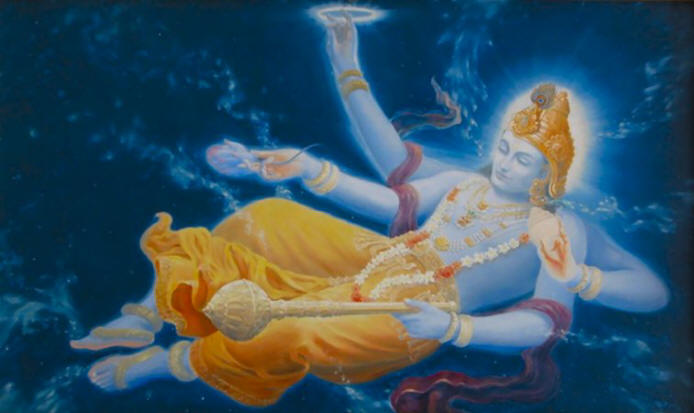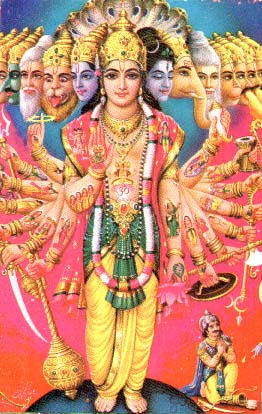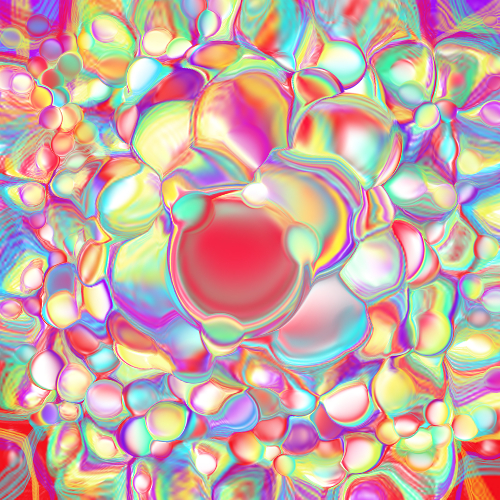The Golden Egg & the Vision of the Cosmic Form

The Self-born Lord who was desirous of creating varieties of subjects from the unmanifest Pradhana [the eternal unmanifest cause] created waters alone at the outset. He instilled vigor in them. The waters are called Naras ... At they outset, they were his place of resort. Hence he is remembered as Narayana. A golden-womb Egg took shape and floated on the waters.
- Brahma Purana I.38-40
In the beginning of each periodic creation the One, who has no beginning and no end, forms the Seven Great Sages (mayarsayah - Rishis) and the Four Manus (X.6). These archetypal primordial beings are born in kalpa after kalpa from the Mind of the Creator, and not in any womb. It is from these sages (Rishis) and Manus that all beings in the world are born (jatas). Manu is not an individual (Rene Guenon); a Manu is a principle of Cosmic Intelligence as the reflected image of the Creator (Brahma) and the prototype of man (manava).
‘Everything that ever appears, lies internally in the absolute in the form of pure consciousness (bhah) and the Absolute is thus compactly full of all phenomena.’
- The Paramarthasara of Abhinavagupta, Verse 10
Thus the All emerges from the Mind of the Creator through Its manifesting power (vibhutim yogam). Krishna tells Arjuna that there is no doubt that those who know this Truth are united with the Supreme Self, Paramatman (X.7). There can be no doubt when you Know!
The World Egg / Hiranya-garbha
Hiranya-garbha is the Golden Embryo or Cosmic World Egg out of which will develop the ‘primordial germ of cosmic Light’ (Rene Guenon). Guenon points out that this symbol of the World Egg is found in the Egyptian tradition, the Druid, and the Orphic.
‘The cosmic egg is externally enveloped by water ten times its magnitude. The water is externally enveloped by fire ten times its mass. The fire is externally enveloped by air ten times its mass. The air is enveloped by the ether ten times its magnitude ... the coverings of the cosmic egg are seven (the intellect - mahat, ego - ahamkara, and the five subtle elements - tanmatras). There within is Brahma [the Creator] seated on the lotus. There are crores and crores [thousands] of such eggs in existence.’
- The Linga Purana, Ch.3, Verse 30-33
Knowing God to be the ultimate Source of All (sarvasya prabhavah) the worlds and that everything proceeds, literally the wheels within wheels ‘roll onward’ (W.Sargeant), from the Supreme Self (Paramatman) - the wise (budhas), who have realized the Truth by the power of discrimination through a contemplative Love for that which they are, honor the God in the All (X.8).
Krishna says that those who have attained Union with the God-within enjoy speaking to each other the words of wisdom that are a source of joy and delight. Such conversations, with those who are devoted to remaining immersed in the Knowledge of the One, will awaken, enlighten, and bring happiness (X.3).
Hridaya the Heart
‘The two that have entered into the cavity (of the Heart) are indeed the individual self and the Supreme Self, because it is seen.’
- Brahma-Sutras I.2.11
The Lord of all of Worlds, who dwells in the Heart (hridaya), gives Knowledge (buddhi-yogam) to the ones who are steadfast (yuktanam) in their focused devotion. The Heart here - hridaya in Sanskrit - is not the physical organ that pumps blood through the body. It is the ‘center not only of the corporeal individuality, but of the integral individuality, capable of indefinite extension in its own sphere (which occupies, moreover, but one degree of existence), and of which the corporal modality constitutes only a portion’ (Rene Guenon). You are far more than the physical body.
The God within our Heart is moved to compassion by our one pointed devotion. W.Sargeant gives the literal translation of compassion (anukampa) as ‘trembling alongside’ and I find this very insightful. The Lord of our Heart is feeling with us our passionate intent on returning Home and final liberation (moksha) from the self-created temporal illusory hologram. From such trembling alongside, meaning feeling the vibrational frequency of our Love, God is compassionate, feeling-with us - and because of our single minded purposefulness, destroys the darkness which is born of ignorance (tamas) with the luminous lamp of Knowledge (X.10-11).
‘... thus loving ceaselessly -
I give a mind of perfect mood, whereby they draw to me;
And, all for love of them, within their darkened souls I dwell,
And, with bright rays of wisdom’s lamp, their ignorance dispel.’
- Ganguli (X.10-11)
Arjuna now tells his friend that indeed he recognizes the Supreme Self within Krishna and asks him to speak of those powers by which The Lord of the Worlds manifests Its Self in infinite forms.
As God fully Realized in man, Krishna answers Arjuna:
I am the Spirit seated deep in every creature's heart;
From Me they come; by Me they live; at My word they depart!
- Ganguli (X.20)
The Creator of all beings (sarva-bhuta) abides in their Heart. The Lord is our beginning, middle, and end - our birth, life, and death.
Krishna enumerates a small portion of the ‘Heavenly Perfections’:
... of the faculties to living beings given, The mind which apprehends and thinks (X.22)
... of all the water-floods the Sea which drinketh each (X.24)
...and OM of sacred speech; Of prayers the prayer ye whisper (X.25)
Time's self I am ...
The lordly-painted tiger (X.30)
The whirlwind 'mid the winds (X.31)
First, and Last, and Centre of all which is or seems
I am, Arjuna! Wisdom Supreme of what is wise (X.32)
And Endless Life, and boundless Love, whose power
sustaineth each (X.33)
And bitter Death which seizes all, and joyous sudden Birth,
Which brings to light all beings that are to be on earth (X.34)
... of metres Gayatri (X.35)
... of saints Vyasa, sage divine;
The policy of conquerors, the potency of kings,
The great unbroken silence in learning's secret things (X.38)
- Ganguli
The Supreme Self (Paramatman) is the seed (bijam) of all beings. Nothing could exist without God (X.39). There is no end to the Creator’s divine (divyanam) manifestations (vibhutinam) and what Krishna has spoken of is only a small part. Even those beings who are endowed with splendor and glory emerge from only a fraction of the Lord’s Power (X.41).
Universes floating like bubbles in an ocean
 In the
final verse of Book X, Krishna says something which suggests that this universe
is only one of many that ‘like bubbles in an ocean’ float in ‘the substantive
cause’ that God is (Paramarthasara of Abhinavagupta, Verse 15). Krishna says
that the Creator supports this entire universe with only a fraction of Its
Being.
In the
final verse of Book X, Krishna says something which suggests that this universe
is only one of many that ‘like bubbles in an ocean’ float in ‘the substantive
cause’ that God is (Paramarthasara of Abhinavagupta, Verse 15). Krishna says
that the Creator supports this entire universe with only a fraction of Its
Being.
The Gambhirananda version translates the verse as:
I remain (sthitah) sustaining and pervading (vishtabhya) this whole creation (universe-jagat) by a part, a mere portion (ekamsena) of Myself (X.42).
अथवा
बहुनैतेन
किं
ज्ञातेन
तवार्जुन
.
विष्टभ्याहमिदं
कृत्स्नमेकांशेन
स्थितो
जगत्
.. १०-
४२..
athavā bahunaitena kiṃ jñātena
tavārjuna
viṣṭabhyāham idaṃ kṛtsnam ekāṃśena sthito jagat 10.42
The creation of this universe (jagat) requires only ‘a mere portion’ of the Lord of the Worlds, therefore one may conclude that Krishna is implying the existence of other universes.
A verse from the Rig Veda is referred to in both the Abhinavagupta commentary and the Gambhirananda translation. The Vedas are revered as revealed Truth and here set a foundation for the understanding of our temporal illusory universe as only one of many universes.
Shyam Ghosh’s ‘The Rigveda for the Layman’ provides an insightful translation of this illuminating verse:
This Purusha [the Creator & Supreme Spirit], while pervading, distributes (emits) its great power and thus (in this manner) everything gets produced. The beings are each only a single ray [padah - foot, range, a ray of light] emitted by the all-pervading one, while its other rays remain in eternal space all the time.
- Rig Veda X.90.4
Book XI - The Vision of the Divine Universal Cosmic Form
 Arjuna
tells Krishna that he now understands the secret mysteries of the Supreme Self
(adhy-atma) and his delusion (mohas) is gone (XI.1). Arjuna has recognized the
Supreme Spirit (Purushottama) within his dear friend Krishna and wishes to see
his godly (aishvaram) form (rupam). Arjuna wants a vision of Krishna’s eternal
divine form, if Krishna considers him to be competent to see that form
(XI.2-4).
Arjuna
tells Krishna that he now understands the secret mysteries of the Supreme Self
(adhy-atma) and his delusion (mohas) is gone (XI.1). Arjuna has recognized the
Supreme Spirit (Purushottama) within his dear friend Krishna and wishes to see
his godly (aishvaram) form (rupam). Arjuna wants a vision of Krishna’s eternal
divine form, if Krishna considers him to be competent to see that form
(XI.2-4).
This is the moment so often recreated in painting by artists throughout the centuries. The vision is spectacular and one of both incomparable beauty and power along with utter horror.
I have chosen to again quote from the Kisari Mohan Ganguli translation (1883-1896) because I feel that Vyasa’s poetic imagery is well served here by Ganguli’s Victorian style; and it is online at the Internet Sacred Text Archive in the public domain. Most readers feel a bit frustrated by this translation and find the Victorian day filters of Ganguli’s interpretations rather archaic and antiquated, too limited and impenetrable. However after reading many translations of the Bhagavad Gita, I find Ganguli’s poetic expression, now and then, both pleasing and illuminating.
Gaze, then, thou Son of Pritha! I manifest for thee
Those hundred thousand thousand shapes that clothe my Mystery:
I show thee all my semblances, infinite, rich, divine,
My changeful hues, my countless forms. (XI.5)
Behold! this is the Universe! - Look! what is live and dead
I gather all in one - in Me! (XI.7)
Thou canst not! - nor, with human eyes, Arjuna! ever mayest!
Therefore I give thee sense divine. Have other eyes, new light!
And, look! This is My glory, unveiled to mortal sight! (XI.8)
Arjuna would not be able to ‘see’ this form of Krishna with the physical eye alone, and therefore Krishna has given him the the eye (caksuh) that is supernatural (divyam). The Divine Eye is the Eye of the Mind, or the Third Eye which is activated by the hormonal secretions of the pineal gland. It is through this Eye that the Invisible Realms are perceived and it is because we no longer know about this eye and how to use it, that here in the Kali Yuga we have become relegated to the five senses, quite unaware of the myriad other worlds that do exist and have always existed all around us.
However I am also certain that this gift of ‘sight’ Krishna is bestowing upon his friend Arjuna is far greater than most Inner Eye experiences. We ‘see’ only that which resonates with the frequency of our own consciousness. Arjuna would not be able to experience the Vision of Krishna’s Divine Cosmic Form if his consciousness had not been lifted and attuned to the pulsating vibratory rate of that frequency which constitutes the highest awareness.
The Battlefield & the Remote Viewer
Remember that this entire conversation between our heroes, Krishna and Arjuna, is taking place in the middle of the battlefield Kurukshetra. Krishna has parked Arjuna’s chariot between the thousands of warriors on both sides who are waiting for the command to begin the slaughter. Moreover the conversation itself is being told to the enemy king, Dhritarashtra, by a seer who has the ability to see things at a distance. In other words, the story is told via a remote viewer.
We are not told if the thousands of warriors on the battlefield can also ‘see’ the Vision of the Divine Form, and it is possible that it is only the ‘seer’ communicating to King Dhritarashtra back in the palace who has the siddhic power to ‘see’ Krishna’s Cosmic Form. In any case, this wondrous manner in which the Bhagavad Gita is told enhances the mysterious nature of its content and is further evidence of the author Vyasa’s metaphysical and poetic genius.
In the next six verses (XI.9-14), it is the remote viewer, Sanjaya, who speaks and describes to King Dhritarashtra what he sees:
Then, O King! to God, so saying,
Stood, to Pritha's Son [Arjuna] displaying
All the splendour, wonder, dread
Of His vast Almighty-head. (Ganguli, XI.9)
Out of countless eyes beholding,
Out of countless mouths commanding,
Countless mystic forms enfolding
In one Form: supremely standing
Countless radiant glories wearing,
Countless heavenly weapons bearing, (XI.10)
Crowned with garlands of star-clusters,
Robed in garb of woven lustres,
Breathing from His perfect Presence
Breaths of every subtle essence
Of all heavenly odours; shedding
Blinding brilliance; overspreading-
Boundless, beautiful- all spaces
With His all-regarding faces;
So He showed! (XI.11)
If there should rise
Suddenly within the skies
Sunburst of a thousand suns
Flooding earth with beams undeemed-of,
Then might be that Holy One's
Majesty and radiance dreamed of! (XI.12)
So did Pandu's Son behold
All this universe enfold
All its huge diversity
Into one vast shape, and be
Visible, and viewed, and blended
In one Body - subtle, splendid,
Nameless - th' All-comprehending
God of Gods, the Never-Ending
Deity! (XI.13)
In our current vernacular, we might say that Arjuna’s mind was blown! Some translations say that his hair was standing on end. Most of us can identify with Arjuna when we try to imagine the total amazement (vismaya) he must have been thrown into. The greatest warrior in the world then kneels, with his hands clasped together, he bows his head and cries. Like the rivers seeking the Sea, tears flow easily when we feel close to God. The remote viewer, Sanjaya, says this:
But, sore amazed,
Thrilled, o'erfilled, dazzled, and dazed,
Arjuna knelt; and bowed his head,
And clasped his palms; and cried, and said (Ganguli, XI.14):
Arjuna:
Yea! I have seen! I see!
Lord! all is wrapped in Thee!
The gods are in Thy glorious frame! the creatures
Of earth, and heaven, and hell
In Thy Divine form dwell,
And in Thy countenance shine all the features
Of Brahma, sitting lone
Upon His lotus-throne;
Of saints and sages, and the serpent races
Ananta, Vasuki; (XI.15)
Yea! mightiest Lord! I see
Thy thousand thousand arms and breasts, and faces,
And eyes, - on every side
Perfect, diversified;
And nowhere end of Thee, nowhere beginning,
Nowhere a centre! Shifts -
Wherever soul's gaze lifts -
Thy central Self, all-wielding, and all-winning!
Infinite King! (XI.16)
I see
The anadem on Thee,
The club, the shell, the discus; see Thee burning
In beams insufferable,
Lighting earth, heaven, and hell
With brilliance blazing, glowing, flashing; turning
Darkness to dazzling day,
Look I whichever way; (XI.17)
Ah, Lord! I worship Thee, the Undivided,
The Uttermost of thought,
The Treasure-Palace wrought
To hold the wealth of the worlds; the Shield provided
To shelter Virtue's laws;
The Fount whence Life's stream draws
All waters of all rivers of all being:
The One Unborn, Unending: (XI.18)
Unchanging and Unblending!
With might and majesty, past thought, past seeing!
Silver of moon and gold
Of sun are glories rolled
From Thy great eyes; Thy visage, beaming tender
Throughout the stars and skies,
Doth to warm life surprise
Thy Universe. (XI.19)
The worlds are filled with wonder
Of Thy perfections! Space
Star - sprinkled, and void place
From pole to pole of the Blue, from bound to bound,
Hath Thee in every spot,
Thee, Thee! - Where Thou art not,
O Holy, Marvellous Form! is nowhere found! (XI.20)
As Krishna has said earlier, Vasudeva sarvam iti (VII.19) - God is All!
The Brahma Purana, Part I
Translated by a Board of Scholars
Motilal Banarsidass Publishers, 1985, 2001; Delhi
Man & His Becoming According to the Vedanta
Rene Guenon, 1925
Sophia Perennis, 2001; Ghent, NY
The Linga Purana / Part I
Translated by a Board of Scholars
Motilal Banarsidass Publishers, 1973, 1997; Delhi
The Brahma Sutras
Translated by Swami Vireswarananda
Advaita Ashrama Publishers, 1982; Himalayas
Essence of the Exact Reality or Paramarthasara of Abhinavagupta
Translated by B.N. Pandit
Munishiram Manoharlal Publishers, 1991; Delhi
Rgveda for the Layman
Shyam Ghosh
Munishiram Manoharlal Publishers, 2002; New Delhi
Images at vishvarupa.com/vishnu-vishnu.html
